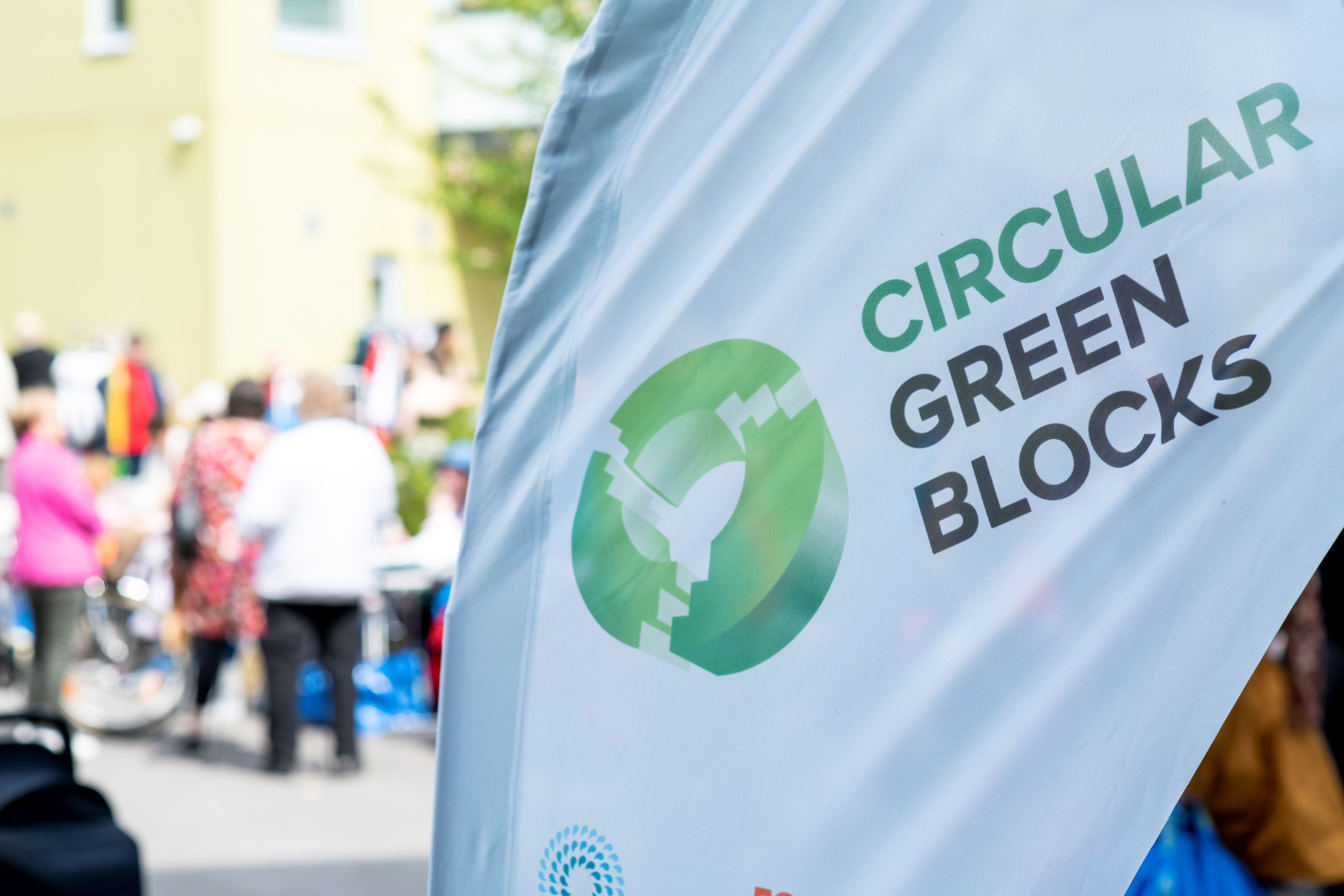Circular Green Blocks project selected as one of the finalists for the New European Bauhaus Prizes 2024
The Circular Green Blocks project has been selected as one of the finalists for the New European Bauhaus Prizes 2024, standing out from over 530 applications. The winners of the NEB Prizes 2024 will be announced during the New European Bauhaus Festival in Brussels on April 12. The online public voting is open until March 27.
The Circular Green Blocks - Sustainable city quarters as circular economy business promoters project was coordinated by the Helsinki Region Environmental Services and partnered by Metropolia University of Applied Sciences, Forum Virium Helsinki and Aalto University. The project took place in 2021-2023 and was supported by a grant from the European Regional Development Fund.
The project tailored and tested sustainable circular and sharing economy solutions together with housing companies and companies which support green growth. The piloting covered areas such as sustainable mobility, urban gardening, sharing and lending of supplies, communal work and local logistics.
The residents of the pilot blocks were actively participating in the project.
“The project has received lots of positive feedback as it has enhanced the sense of belonging with its shared solutions and with the events organised in the neighbourhoods”, Project Manager Lassi Sarlos from the Helsinki Region Environmental Services tells.
Vote for your favorite – the voting is open until March 27
The NEB Prizes 2024 winners will be announced at an awards ceremony on April 12 during the second edition of the New European Bauhaus Festival in Brussels. The finalists compete in the public voting stage and the voting is open from 6 March at 13:00 (UTC+2) to 27 March 2024 at 18:00 (UTC+2).
Voting is possible on the European Commission website.

Residents’ active participation in the development of new solutions
Communal interaction within the block premises was fostered by residents’ active participation in the project. The residents could, for instance, affect which services and activities were piloted in their own neighbourhood.
“When residents are involved in the project from the very beginning, they feel more ownership over its outcomes, and their sense of belonging grows. In the NEB Prizes 2024, our project competes in the Regaining a sense of belonging category which matches well with our project goals and achievements”, Project Manager Jenni Merjankari from Metropolia explains.
“It was important to offer residents various ways to influence the project. Some may want to vote on their favorite solutions, while others may be interested in joining workshops and developing the solutions further”, Merjankari continues.
Development Manager Kaisa Spilling from Forum Virium Helsinki emphasises that joint development is crucial for experimental culture.
“It was a pleasure to notice how eagerly residents wanted to take part in both development and testing in the pilots”, Spilling tells.
Project Manager Heikki Kauhanen from Aalto University notes the importance of wording when explaining what solutions mean to the residents.
“It is important that residents feel the solutions respond to the challenges they have experienced and recognised. In Aalto University, we developed a 3D geoinformation demonstration based on the residents’ need to analyse the behaviour of runoff water on their blocks", Kauhanen tells.
Metropolia brought expertise in circular economy, service design and co-development to the project team and was responsible for mapping the needs and the available spaces in the pilot blocks. As one of the project pilots, Metropolia organised a series of three neighbourhood events on circular economy. In addition, Metropolia’s experts organised coaching workshops to support the SMEs in identifying and developing new circular economy business opportunities within the city block environment.
Metropolia towards sustainable future
Metropolia became an official partner of the New European Bauhaus in July 2021. The New European Bauhaus is a missionary European movement that challenges a holistic reflection on our current way of life and has an ambitious goal to reconcile the values of societies and everyday lifestyles with ecological boundary conditions.
Sustainability is central to Metropolia’s strategy. Together with its partners Metropolia investigates and looks for sustainable solutions. The Circular Green Blocks is a great example and continuation of the important collaboration between higher education institutions, public sector, civil society and companies towards climate neutrality.
Metropolia strengthens its collaboration internationally. In September 2023, Metropolia became the chair of the U!REKA European University alliance. Since January 2024, the alliance has been co-funded by the European Commission and aims to contribute to the European Union’s mission for Climate-Neutral and Smart Cities. The alliance establishes a sustainable inter-university campus that gives basis for partners’ long-term collaboration in research, development, innovation and education and brings together local actors to work with even greater networks abroad.
Further information
Jenni Merjankari
Circular Green Blocks Project Manager
Senior Lecturer, Metropolia University of Applied Sciences
jenni.merjankari [at] metropolia.fi (jenni[dot]merjankari[at]metropolia[dot]fi)
Lassi Sarlos
Circular Green Blocks Project Manager
Project Manager, Helsinki Region Environmental Services
lassi.sarlos [at] hsy.fi (lassi[dot]sarlos[at]hsy[dot]fi)
Päivi Keränen
Project Manager, Metropolia University of Applied Sciences
paivi.keranen [at] metropolia.fi (paivi[dot]keranen[at]metropolia[dot]fi)
Circular Green Blocks - Sustainable city quarters as circular economy business promoters project (9/2021–9/2023) contributed to circular and sharing economy solutions together with housing companies, residents and companies which support green growth. The project was coordinated by the Helsinki Region Environmental Services and partnered by Metropolia University of Applied Sciences, Forum Virium Helsinki and Aalto University. The project received funding from the European Regional Development Fund as part of the European Union’s actions in response to the Covid-19 pandemic.
